Leader comment: Let caution be Nicola Sturgeon's watchword


Many Scots would view a blocking move as legitimate. The referendum showed Scotland’s vote markedly at odds with the UK. While Britain voted by 52 per cent to 48 per cent to leave, here in Scotland 62 per cent backed Remain and only 38 per cent Leave.
It underlines the degree to which Scotland is, culturally and politically, distinct from the UK. And, as last Thursday’s vote will have a profound effect on Scotland’s international trade and external relations, it reinforces the claim that a significant change has taken place since 2013, fully justifying a second independence referendum.
Advertisement
Hide AdAdvertisement
Hide AdThere are compelling reasons why the First Minister should proceed with caution. There would need to be a stronger public appetite for a rerun of the independence battle. Voter fatigue is setting in and a move to an early second referendum may backfire.
Second, there would be widespread dismay in the business community at the prospect of a second referendum: the huge uncertainties after the EU vote are enough to contend with.
Business confidence is fragile, many investment decisions if not already on hold, would be placed deep into cold storage. Business would struggle to perform against the backdrop of constant constitutional argument.
There would be searching questions on the robustness of Scotland’s public finances given the collapse in North Sea oil revenues since the 2013 referendum and the ability of an independent Scotland to sustain its spending and welfare commitments.
Withholding consent from legislation that would give effect to a UK exit from the EU would be bitterly resented by voters in the rest of the UK with potentially explosive consequences for relations between Westminster and Holyrood. What would be the standing of the “social union” and the “velvet divorce” that were much touted by the SNP in 2013 to reassure nervous voters?
In the event, it may be, as constitutional law expert and Conservative MSP Adam Tomkins argues, that while Holyrood may have the power to withhold consent, this is not the same as blocking.
Finally, there is the highly febrile and uncertain state of affairs over what now happens to the UK-EU relations. It is not inconceivable that the complexities of withdrawal, coupled with a change in thinking in Brussels about the direction of travel for the EU could create the circumstances for a second referendum – one which results in a vote to Remain. Such an outcome is not without precedent in the EU.
For these reasons, the prudent course for the First Minister would be to make her desire for a second independence referendum plain while leaving options open as to timing. The tumultuous events of the past week and their consequences need an opportunity to settle.